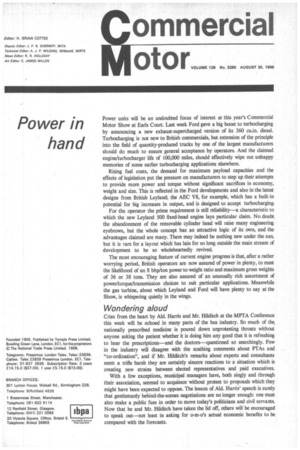Power in hand
Page 11

If you've noticed an error in this article please click here to report it so we can fix it.
Power units will be an undoubted focus of interest at this year's Commercial Motor Show at Earls Court. Last week Ford gave a big boost to turbocharging by announcing a new exhaust-supercharged version of its 360 cu.in. diesel. Turbocharging is not new to British commercials, but extension of the principle into the field of quantity-produced trucks by one of the largest manufacturers should do much to ensure general acceptance by operators. And the claimed engine/turbocharger life of 100,000 miles, should effectively wipe out unhappy memories of some earlier turbocharging applications elsewhere.
Rising fuel costs, the demand for maximum payload capacities and the effects of legislation put the pressure on manufacturers to step up their attempts to provide more power and torque without significant sacrifices in economy, weight and size. This is reflected in the Ford developments and also in the latest designs from British Leyland; the AEC V8, for example, which has a built-in potential for big increases in output, and is designed to accept turbocharging.
For the operator the prime requirement is still reliability—a characteristic to which the new Leyland 500 fixed-head engine lays particular claim. No doubt the abandonment of the removable cylinder head will raise many engineering eyebrows, but the whole concept has an attractive logic of its own, and the advantages claimed are many. There may indeed be nothing new under the sun, but it is rare for a layout which has lain for so long outside the main stream of development to be so wholeheartedly revived.
The most encouraging feature of current engine progress is that, after a rather worrying period, British operators are now assured of power in plenty, to meet the likelihood of an 8 bhp/ton power to weight ratio and maximum gross weights of 36 or 38 tons. They are also assured of an unusually rich assortment of power/torque/transmission choices to suit particular applications. Meanwhile the gas turbine, about which Leyland and Ford will have plenty to say at the Show, is whispering quietly in the wings.
Wondering aloud
Cries from the heart by Aid. Harris and Mr. Hilditch at the MPTA Conference this week will be echoed in many parts of the bus industry. So much of the, nationally prescribed medicine is poured down unprotesting throats without anyone asking the patient whether it is doing him any good that it is refreshing to hear the prescriptions—and the doctors—questioned so searchingly. Few in the industry will disagree with the scathing comments about PTAs and "co-ordination", and if Mr. Hilditch's remarks about experts and consultants seem a trifle harsh they are certainly sincere reactions to a situation which is creating new strains between elected representatives and paid executives.
With a few exceptions, municipal managers have, both singly and through their association, seemed to acquiesce without protest to proposals which they might have been expected to oppose. The lesson of Aid. Harris' speech is surely that gentlemanly behind-the-scenes negotiations are no longer enough: one must also make a public fuss in order to move today's politicians and civil servants. Now that he and Mr. Hilditch have taken the lid off, others will be encouraged to speak out—not least in asking for o-m-o's actual economic benefits to be compared with the forecasts.




















































































